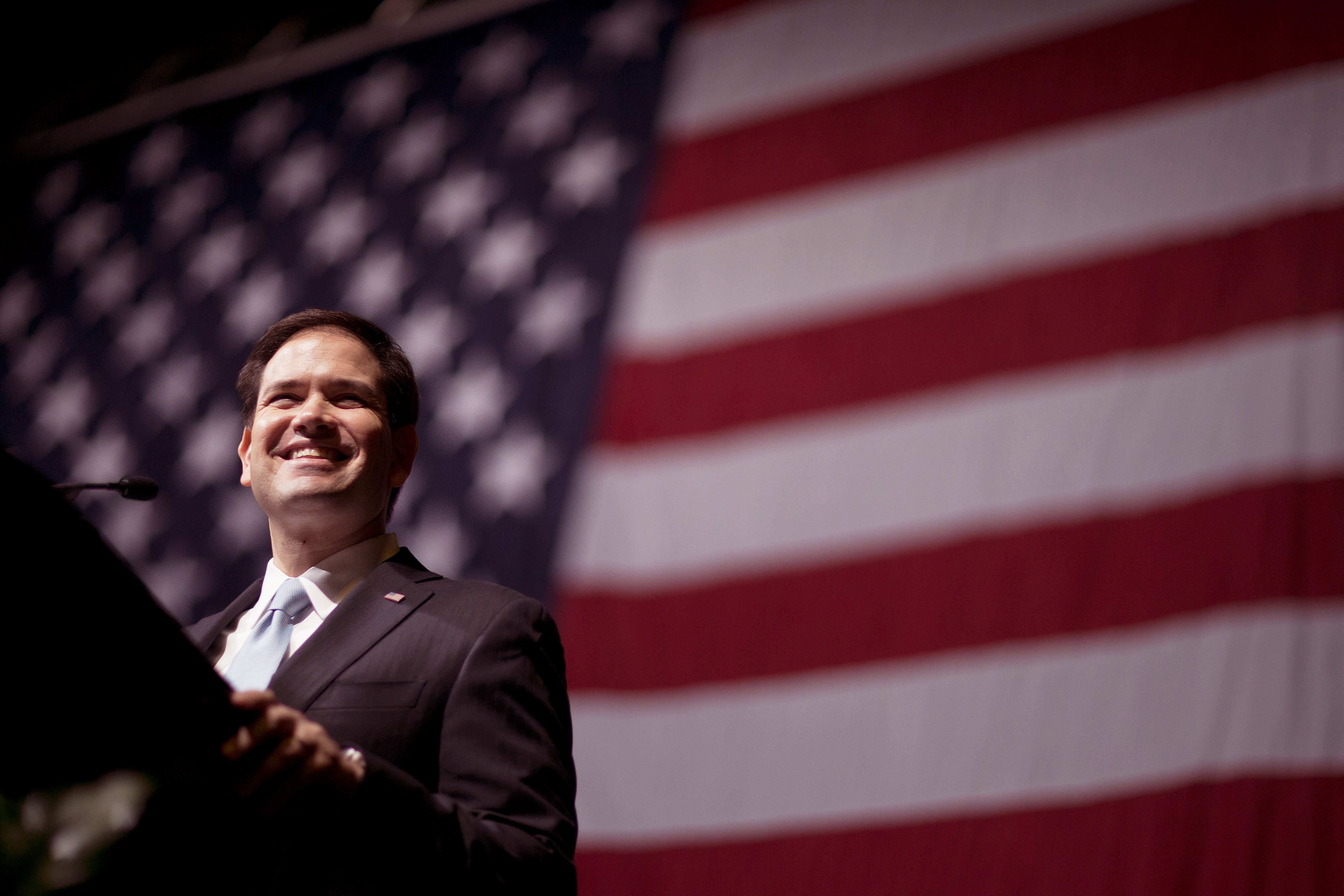Marco Rubio's appealing ambiguity
The 2016 candidate contains multitudes


Marco Rubio is an older Republican's idea of a younger Republican, we've been told.
In a fun bit of racial and generational essentialism, Ana Marie Cox went through the senator's positions and claimed that "the only demographic Rubio can plausibly claim to represent is old white guys." This is not a surprise. It isn't new. People jostle over these questions of identity all the time: Sarah Palin isn't a real woman; Barack Obama isn't really black.
But a very diverse democracy makes ambiguous, line-crossing identities an asset. And Rubio presents the most intriguing kind of biography to the race.
The Week
Escape your echo chamber. Get the facts behind the news, plus analysis from multiple perspectives.

Sign up for The Week's Free Newsletters
From our morning news briefing to a weekly Good News Newsletter, get the best of The Week delivered directly to your inbox.
From our morning news briefing to a weekly Good News Newsletter, get the best of The Week delivered directly to your inbox.
In fact, Rubio is running on his biography more than he is running on position papers, which is a good move. The heart of his campaign announcement speech wasn't a list of policy proposals, it was a story about being an immigrant, about being working class, about rising to a position of prestige and power. Most of Rubio's big speeches are variations on themes drawn from his biography.
The multiplicity of Rubio's identities doesn't make him illegible, it makes him intriguing. And it gives different groups of voters different ways of relating to him.
Rubio traverses a wide range of experience in his economic background. "My father became a bartender. My mother a cashier, a maid, and a Kmart stock clerk. They never made it big. But they were successful. Two immigrants with little money or education found stable jobs, owned a home, retired with security, and gave all four of their children a life far better than their own," he says.
In American Son and some speeches, he talks about the burden of student loan debt that crushed his monthly budget as a young father and that seemed to be leading him away from his dream of pursuing a life in public service. And yet, Rubio proved more than successful at rising.
A free daily email with the biggest news stories of the day – and the best features from TheWeek.com
This diversity of experience extends to his religion, where Rubio manages to present himself almost simultaneously as a lifelong ethnic Catholic, an Evangelical convert, and a Catholic convert. And that's because basically, he is those things. He was raised Catholic. But he and his wife eventually began attending an Evangelical church where she grew spiritually, and they heard the Biblical preaching they hungered for. And then he can talk about his attachment to the liturgical life and sacraments of the Roman Church.
A few listeners will find this all a bit too exotic, or even confused. But when he conveys these stories he can touch on little details that ring in a very personal way with different groups of voters. They hear something of their own story in his, and then they hear something more.
This is what presidents do. John F. Kennedy managed to be the first electable Catholic candidate for president, and could connect to the massive pool of voters who descended from the Great Wave of Immigration in the late 19th century. But the Kennedys lived in a style and fashion that was far removed from the hardscrabble roots of Al Smith, the former New York governor and unsuccessful presidential candidate. Smith seemed to stink of New York's fish markets. Kennedy lived like a WASP scion.
Barack Obama's identity was similarly mixed by the circumstances of his birth. He was black and white. He was raised in Hawaii, where racial politics were entirely different from those of America's South or cities. But he had adopted Chicago as his home, and put himself at the center of urban organizing.
Like Obama and Kennedy, Rubio seems to have sensed at an early age how his personal identity could make for an attractive political persona, and then shaped his resume, his policy-profile, and experiences to emphasize the point. Politics at this level is almost like a casting call. The life of a nation is a kind of drama and voters are the audience. Politicians put themselves forward as a stage-character, a protagonist who can meet the moment.
As a protagonist in America's drama, Rubio's role is to represent the rise of the last great wave of immigration to this country, and his role is to reconcile the Republican Party with the future that includes these immigrants and their descendants not just as beneficiaries of America's generous immigration policy and dynamic economy, but as full Americans with a full say in the nation's future.
That older white Republican voters like Marco Rubio is only going to help Marco Rubio. He gives them hope that their ideals will outlive the Nixon-Reagan coalition. And the voters that matter in battleground states are not always so ideological as journalists think.
There is no chance that, like Ana Marie Cox, voters will quickly roll through a known rolodex of Rubio's political positions and then re-classify him as old, rich, and white. People in a diverse democracy want "one of us" to represent them; sympathetic voters will find the part of Rubio that matches their own self-conception.
Of course there is an element of fakery to political personas at this level. Rubio's own biography is sometimes messier than presented. But fakers have a way of becoming what they present, at least in America.
Michael Brendan Dougherty is senior correspondent at TheWeek.com. He is the founder and editor of The Slurve, a newsletter about baseball. His work has appeared in The New York Times Magazine, ESPN Magazine, Slate and The American Conservative.
-
 ‘Something close to a universal rallying cry’
‘Something close to a universal rallying cry’Instant Opinion Opinion, comment and editorials of the day
-
 Trump sues IRS for $10B over tax record leaks
Trump sues IRS for $10B over tax record leaksSpeed Read The president is claiming ‘reputational and financial harm’ from leaks of his tax information between 2018 and 2020
-
 Ex-Illinois deputy gets 20 years for Massey murder
Ex-Illinois deputy gets 20 years for Massey murderSpeed Read Sean Grayson was sentenced for the 2024 killing of Sonya Massey
-
 The billionaires’ wealth tax: a catastrophe for California?
The billionaires’ wealth tax: a catastrophe for California?Talking Point Peter Thiel and Larry Page preparing to change state residency
-
 Bari Weiss’ ‘60 Minutes’ scandal is about more than one report
Bari Weiss’ ‘60 Minutes’ scandal is about more than one reportIN THE SPOTLIGHT By blocking an approved segment on a controversial prison holding US deportees in El Salvador, the editor-in-chief of CBS News has become the main story
-
 Has Zohran Mamdani shown the Democrats how to win again?
Has Zohran Mamdani shown the Democrats how to win again?Today’s Big Question New York City mayoral election touted as victory for left-wing populists but moderate centrist wins elsewhere present more complex path for Democratic Party
-
 Millions turn out for anti-Trump ‘No Kings’ rallies
Millions turn out for anti-Trump ‘No Kings’ ralliesSpeed Read An estimated 7 million people participated, 2 million more than at the first ‘No Kings’ protest in June
-
 Ghislaine Maxwell: angling for a Trump pardon
Ghislaine Maxwell: angling for a Trump pardonTalking Point Convicted sex trafficker's testimony could shed new light on president's links to Jeffrey Epstein
-
 The last words and final moments of 40 presidents
The last words and final moments of 40 presidentsThe Explainer Some are eloquent quotes worthy of the holders of the highest office in the nation, and others... aren't
-
 The JFK files: the truth at last?
The JFK files: the truth at last?In The Spotlight More than 64,000 previously classified documents relating the 1963 assassination of John F. Kennedy have been released by the Trump administration
-
 'Seriously, not literally': how should the world take Donald Trump?
'Seriously, not literally': how should the world take Donald Trump?Today's big question White House rhetoric and reality look likely to become increasingly blurred
